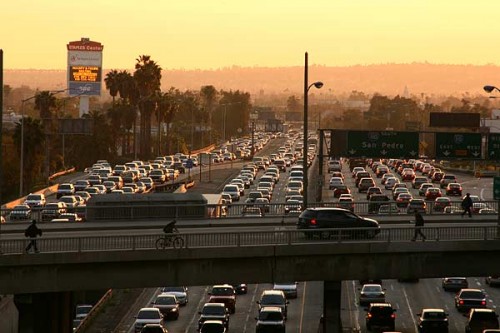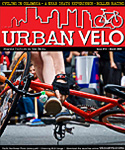Boston’s Future Lies In Moving Away From The Car
People will sometimes ask me, “Why do you hate cars so much?” The truth is I don’t hate cars. They are useful to some people (delivery trucks, people with disabilities). The car itself is not the problem, it is what happens to society when everyone owns a car that is the problem. Cars are simply a representation of two real problems.
1. The burning of gasoline for transportation.
2. The idea that a car = freedom.
Burning Gas For Fuel:
It has been calculated that if every car in America was suddenly an electric vehicle, and we burned nothing but coal to produce the electricity to power those cars, we would still reduce the amount of co2 that we pump into the air. This is mostly due to the fact that an electric motor is about 90% efficient, and the internal combustion engine is about 20% efficient. So it would be fair to say that “I am not against cars, I am against internal combustion engines.”
The current gas powered paradigm requires a never ending supply of gasoline (war for oil anyone?). It’s dirty, its limited (there is only so much oil in the world, and when its gone, its gone), and there is the nagging problem of global warming. So one big step forward would be to stop using gasoline powered cars, but that wont be enough. Even if all the cars ran on electricity, and all that electricity came from renewable sources (wind, solar, etc.) and we never had to worry about global warming, or wars for oil, or pollution from burning oil, we would still have a big big problem.
Cars = Freedom:
Human beings have evolved over the eons to favor things that make thier lives easy, and shy away from those that make them hard. We are literally wired to enjoy things like sugar, fat, and salty foods, mostly because in the stone age we could never get enough of these foods so evolution wired our brains to search out these “easy” sources of calories. We use our big ol’ frontal lobes to come up with all sorts of ideas to make our lives easy. Farming, domestication of animals, automation, computers, cars…the list goes on and on. Evolution rewards (to a point) those humans that were able to “live the good life” by getting enough food and shelter, because those people had the most kids.
Cars (and more importantly car companies) tap right into that part of us that is seeking out the easier way. Why walk for weekss when you can get in your car and drive there in a day? Why ride your bike for days when you can drive your car there in a couple hours? Why walk for an hour to the store, when you can drive in a couple minutes? And you wonder why there is an obesity crisis?
People are not lazy per-say, they are simply falling victim to the wiring in their head. People don’t get fat because they eat too much, they get fat because we live in a modern world of plenty, but their brains are identical to the stone age hunters that had a very hard time getting food. Their brains tell them to eat lots of salty, sugary, fatty foods, and their bodies are designed to store that up for the hard times, they simply had the bad luck to live in a world FULL of these kinds of food. They suffer from a common problem in modern world, our brains and bodies are not set up for the modern world we have created.
The car culture feeds into that trap. It allows us if we so choose to spend our whole lives without walking a significant distance promoting obesity, and weakness. It allows (and encourages) the development of suburbs, and exurbs, and whatever comes after that, that destroy communities and encourage loneliness. It encases us in a little metal shell that promotes road rage (you don’t feel so bad about honking at the anonymous person in the other car, but would never act that way in an elevator). These are the kinds of things they don’t talk about in car commercials.
Even if you throw out all the physical and psychological negative effects on the human body you are still forced to contend with the fact that cars take up a lot of space. Much of the area in a modern city is dedicated to roads and car parking. Much of that land was taken from things like parks, sidewalks, green space, etc. Putting one person in one car, and then doing that a couple thousand times and your nice wide four lane roads suddenly don’t seem large enough anymore. Lets tear down some buildings and build more roads! Then people see the “ease” at which you can get around, so a couple hundred more people buy cars, and low and behold your 8 lane highway isn’t big enough anymore. Lets try a 16 lane highway! Damn that filled up too, better go with 32! Before long you end up with something like this.
Cars are sold as a luxury, as a path to freedom, to something that will make your life better! But in reality you can’t democratize a luxury. What I mean, is that not everyone can have a luxury item, or else it stops being a luxury and starts being a necessity. Cars are no longer a luxury in many places of this country, in a lot of places if you don’t have a car, you can’t get to the store, or to your job, or to school. Our cities have been designed in a such a horrible way that some people are forced to spend a large part of their work week earning enough money to power the car that gets them to work. Yet car commercials still show a lone traveler speeding through the empty city streets without a hint of traffic in sight.
In short, it’s a lie. The car companies sell freedom and mobility, but in fact offer only gridlock, poor land use, health problems, and global warming.
So what?
So what are we to do? If the “one car one person”, model has failed so fully what do we do to reverse it? The answer is simple, but is going to require a lot of effort. We need to stop designing our lives around cars. That means everything from removing on-street parking, building larger sidewalks, making people pay more for parking, building dense cities, providing good public transportation, and getting more people to ride bikes!
If Boston were to take seriously the idea of building a city based around what people need, and not what cars need, it would be a radically different place. Imagine for a second if the T reached every neighborhood, if there was a series of well designed bus routes that connected the places that the MBTA didn’t go. Imagine a system of bike lanes and bike paths that allowed you to get all over town quickly and stress free. Imagine if sidewalks were large and offered lots of space for people to walk and business to have on-street offerings. Imagine the benefits in health (air quality, obesity rates, asthma, cancer, deaths from car crashes). That is only the start, it would also have political implications (foreign policy regarding oil), ecological implications (sea level rise is hard on a city build mostly on landfill).
I would love to live in a city like that. That’s the kind of city you would want to raise a kid in, the kind of place you would want to open a business in. The kind of quiet green place filled with healthy people living close together to encourage community. The kind of place that Boston must become, because the alternative is simply too horrible to contemplate.












2 comments:
really interesting article. i like the point that we're building our cities for/around our cars and their needs, not the needs of people
whats most interesting about this article is that is entirely stolen (even the image is hot linked) the author of this blog didn't write one word of it.
try going to the source, BostonBiker.org...then again not a single word or link has been changed to you wont notice much difference, other than you will be looking at the original work.
Post a Comment